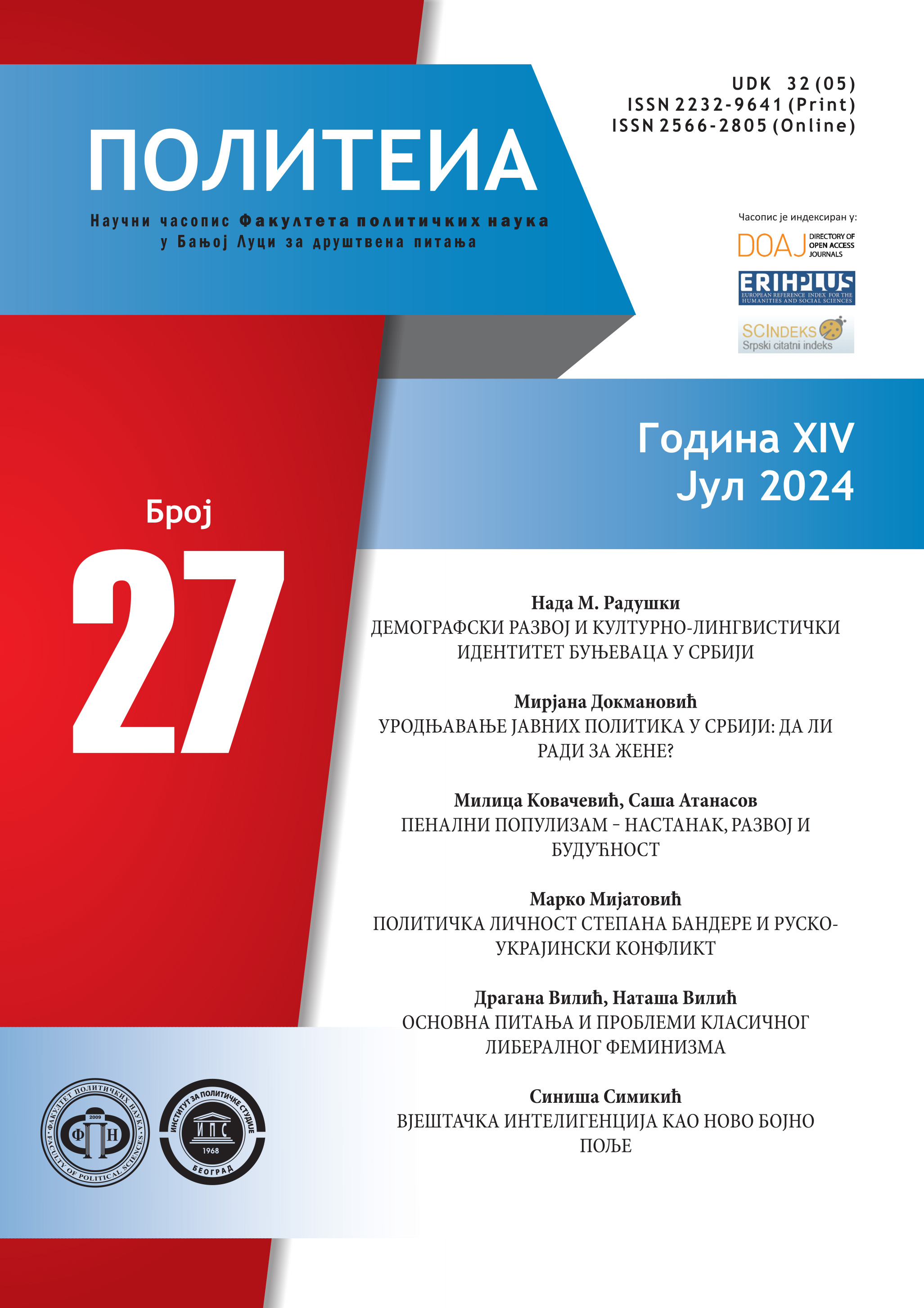BASIC ISSUES AND PROBLEMS OF CLASSICAL LIBERAL FEMINISM
Abstract
Classical liberal feminism represents the theoretical effort and political demand of feminism first manifested in the second half of the 18th century. In that period, numerous factors (economic, social, political), as well as movements in human thought, created the conditions for women to question the relationship of power and their own position in society (I. Milojević). Those first feminist efforts were related to the basic principles of liberalism (equality, freedom, independence), reformulated and extended to women (K. Lončarević). Given the complete civil, political and cultural disenfranchisement of women, classical liberal feminism focused its demands on the achievement of women's equality with men in terms of these rights. The main argument for this is the equality of men and women in terms of reason. Reason is the power of perfection, it represents the bond of the creation with the Creator from whom they all originate, therefore, everyone must have the same nature. The organization of civil society is criticized, which with its mechanisms (education, upbringing, exclusion from all civil and political affairs, etc.) prevents women from cultivating reason (M. Wollstonecraft). Women and men are born equal, therefore law, customs or prejudice should not create differences between them. Representatives of classical liberal feminism advocate the removal of all customary and legal obstacles that stand in the way of women having an active role in society and equal rights, as well as access to all jobs and rewards available to men. The legal subordination of women in itself is wrong and represents the main obstacle to the development of humanity (J. S. Mill). The habit of submission degrades and deadens people, making them incapable of any kind of resistance (H. Taylor Mill). Questions related to the private sphere of men's and women's existence remain outside the interest of liberal feminists in the 18th century (Olympe de Gouges and Mary Wollstonecraft), while representatives of classical liberalism in the 19th century (Harriet Taylor Mill and John Stuart Mill) extend their considerations to issues of marriage and divorce from different positions. Gender inequality has negative consequences for personal and public virtues, which should be based on reason and develop in freedom.
References
De Guž, O. (2009). Deklaracija o pravima žene i građanke. Časopis za književnost i kulturu, i društvena pitanja Reč, 78(24): 147–159.
Duhaček, D. (1994). Predgovor. U Vulstonkraft, M. (1994). Odbrana prava žene: Sa kritičkim opaskama na politička i moralna pitanja (str. 7‒20). Beograd: Filip Višnjić.
Held, D. (1990). Modeli demokracije. Zagreb: Školska knjiga.
Karapetrović, M. (2007). Ona ima ime (o filozofiji i feminizmu). Banja Luka: Art print.
Lončarević, K. (2016). Liberalni feminizam: nekad i sad. Doktorska disertacija. Beograd: Fakultet političkih nauka Univerzitet u Beogradu.
Mil, Dž. S. (1876). O predstavničkoj vladi. Beograd: Državna štamparija.
Mil, Dž. S. & Tejlor Mil, H. (1995). Rasprave o jednakosti polova. Beograd: Filip Višnjić.
Milojević, I. (2011). Tri talasa feminizma, istorijski i društveni kontekst. U I. Milojević & S. Markov (ur.), Uvod u rodne teorije (str. 27‒38). Novi Sad: Mediterran Publishing.
Ravlić, S. (2000). John Stuart Mill, Harriet Taylor i prava žena. Politička misao, 3(XXXVII): 70–85. doi. 316.66–055.2
Ruso, Ž. Ž. (1990). Emil – Sofija ili žena. Valjevo: Estetika. U Vulstonkraft, M. (1994). Odbrana prava žene: Sa kritičkim opaskama na politička i moralna pitanja. Beograd: Filip Višnjić.
Vujadinović, D. (2009). Civilno društvo i političke institucije: Srbija u vrtlogu promena. Beograd: Pravni fakultet Univerziteta u Beogradu i Centar za izdavaštvo i informisanje.
Vulstonkraft, M. (1994). Odbrana prava žene: Sa kritičkim opaskama na politička i moralna pitanja. Beograd: Filip Višnjić.
Autori koji objavljuju u ovom časopisu pristaju na sljedeće uslove:
- Autori zadržavaju autorska prava i pružaju časopisu pravo prvog objavljivanja rada i licenciraju ga "Creative Commons Attribution licencom" koja omogućava drugima da dijele rad, uz uslov navođenja autorstva i izvornog objavljivanja u ovom časopisu.
- Autori mogu izraditi zasebne, ugovorne aranžmane za neekskluzivnu distribuciju članka objavljenog u časopisu (npr. postavljanje u institucionalni repozitorijum ili objavljivanje u knjizi), uz navođenje da je članak izvorno objavljen u ovom časopisu.
- Autorima je dozvoljeno i podstiču se da postave objavljeni članak onlajn (npr. u institucionalni repozitorijum ili na svoju internet stranicu) prije ili tokom postupka prijave rukopisa, s obzirom da takav postupak može voditi produktivnoj razmjeni ideja i ranijoj i većoj citiranosti objavljenog članka (Vidi Efekti otvorenog pristupa).

